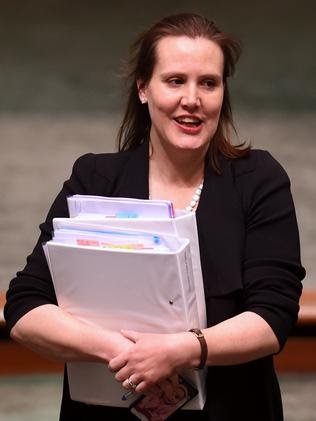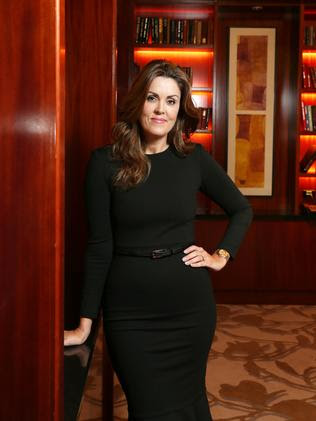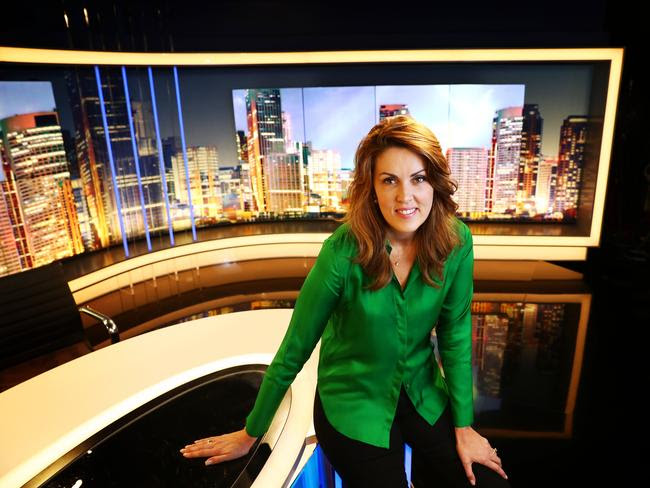The Age
Judith Ireland
27 April 2017
Kelly O’Dwyer’s son Edward was barely a week old when she briefly emerged from maternity leave last week.
The cabinet minister explained she was happy to speak to reporters and be photographed with her baby, because she wanted to send the message you can have a family and a high-powered political career, too.
From her Higgins electorate office in inner-suburban Melbourne, surrounded by old leatherbound law books and cradling her son, O’Dwyer said she was conscious of the lack of political role models for young people. It may be 2017, but she is still the first serving cabinet minister to give birth.
Since having her first child, Olivia, 23 months ago, O’Dwyer has gone from the junior frontbench to a cabinet gig. There was arguably a bit of a blip when she lost the small business portfolio in Malcolm Turnbull’s mid-2016 reshuffle, but the overall trajectory has been objectively groundbreaking.
While O’Dwyer notes there are inevitable compromises as she juggles work and family, she also spoke of how it had been possible to stay actively involved with budget preparations right up until Edward arrived. When she could no longer fly in the last month of her pregnancy, she phoned into cabinet’s expenditure review committee (razor gang) meetings. She was answering a colleague’s questions about superannuation as she went into hospital.
She praised Turnbull for being an “understanding, enlightened” boss, noted she was very lucky to have significant support from her husband Jon Mant and spoke about how technology means she can work anywhere and (importantly) with only one free hand. She also observed it was fortunate her children do not mind falling asleep to the sound of news on the radio.
“It is absolutely possible to serve at the highest levels and have a family,” she said emphatically. “It can be done.”
Oh the irony.
Hours after O’Dwyer’s upbeat comments, came reports she was facing a renewed push to unseat her in Higgins.
Outraged over the government’s new superannuation rules, a self-described “apolitical” group called Save Our Super has been trying to draft Tony Abbott’s former chief-of-staff Peta Credlin to run against O’Dwyer. While Save Our Super actually bobbed up before the 2016 election with no discernable impact on O’Dwyer’s 10 per cent margin and Credlin has likened a political career to “chewing glass”, the damage was done.
O’Dwyer’s message to young women that you can be a mum and a cabinet minister was drowned out by the news that some angry (old, rich) guys were gunning for her career while she was on maternity leave. The real message? Nothing is sacred.
Anyone with a passing interest in Australian politics will be aware that unexpected, unwanted job loss is an occupational hazard. And that parliament is not exactly a best practice employer of women. From Julia “ditch the witch” Gillard to Fiona “sex appeal” Scott there are many examples across the political spectrum that show it still has one foot in the Middle Ages.
But going after an MP – whether they are a cabinet minister or not – days after they have given birth is a new low.
Save Our Super founder Jack Hammond insists the most recent move against O’Dwyer has nothing to do with her maternity leave, even though it’s no secret she just had a baby. And on the ABC’s 7.30 on Monday, the barrister and former Malcolm Fraser adviser seemed comically unaware he was doing himself no PR favours as he criticised the super changes from the confines of his plush dining room.
“They [the Coalition] gave birth to an appalling policy,” he insisted with a straight face.
There are also other murky, narky forces swirling around. As Save Our Super makes unfortunate baby puns, O’Dwyer is caught up in intra-party feuding. A recent failed coup against Victorian Liberal Party President Michael Kroger has not engendered peace and goodwill in the state. Nor has the fact O’Dwyer is among those who backed Kroger challenger, Peter Reith. Note Kroger’s damningly neutral remarks when asked about O’Dwyer’s preselection: “That is a matter for branch members.”
Realistically, O’Dwyer is not under any immediate preselection threat in Higgins. For one thing, the Greens polled 42 per cent in 2016 (more than Labor), so the party would be crazy to replace the sitting MP, who is known for her moderate views on issues such as same-sex marriage. And there is some etiquette against getting rid of sitting cabinet ministers.
But the whole episode is at odds with where the Liberal Party says it wants to – and needs – to go on gender equality. Last year, the Liberal Party signed up to a 10-year plan to boost its female representation in parliament to 50 per cent, which at the moment sits at a woeful 21 per cent (the Nationals are at 14 per cent). This is the lowest level it has been in Canberra for more than two decades.
At the time, there was talk of “organisational reform at the grassroots level”. There was specific mention of the need to bring generation Y and X (of which O’Dwyer is a member) into the party fold. And it was hailed as a big breakthrough for conservative women.
But reforms such as this will go nowhere if women like O’Dwyer continue to succeed despite the political culture around them.
And you shudder to think what young women contemplating a career in politics make of her treatment over the past week.







